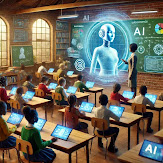What It Means for Africa’s Workforce
Artificial Intelligence (AI) is rapidly transforming industries across Africa, automating repetitive tasks and changing the way people work. While this technological shift presents opportunities, it also raises concerns about job security and economic adaptation.
How AI is Automating Jobs in Africa
AI is being integrated into various sectors, leading to increased efficiency and productivity. Some key areas of job automation include:
Finance and Banking
AI-powered chatbots handle customer service inquiries, reducing the need for human call center agents.
Fraud detection systems analyze transactions in real-time, improving security.
Manufacturing and Agriculture
Robotics and AI-driven machines are automating tasks like packaging, sorting, and even precision farming.
Drones and AI tools assist farmers in monitoring crops, reducing the need for manual labor.
Healthcare and Medicine
AI helps in diagnosing diseases through medical imaging and predictive analysis.
Chatbots and virtual assistants assist patients with basic healthcare inquiries.
Retail and E-commerce
AI automates inventory management, cashier-less checkouts, and personalized recommendations.
Online businesses use AI to enhance customer experience through smart chatbots.
Impact on the Workforce
AI is replacing some traditional roles, but it is also creating new job opportunities. The effects include:
Job Displacement: Routine tasks are being automated, leading to job losses in some industries.
Job Creation: New AI-related roles are emerging, such as data scientists, AI engineers, and digital marketers.
Workplace Transformation: Employees need to adapt by learning new digital skills to stay relevant in a changing job market.
How Africa Can Prepare for AI-Driven Automation
To benefit from AI while minimizing job losses, African governments and businesses must:
Invest in Education & Digital Skills Training: More emphasis on STEM (Science, Technology, Engineering, and Mathematics) education is needed.
Support Innovation & Startups: Encouraging AI-driven businesses can create more employment opportunities.
Adopt AI Ethically: Companies should ensure AI complements human jobs rather than fully replacing them.
Conclusion
AI in job automation is inevitable, but Africa can harness its potential by upskilling the workforce and embracing innovation. The future of work will be defined by how well people adapt to these technological changes.

